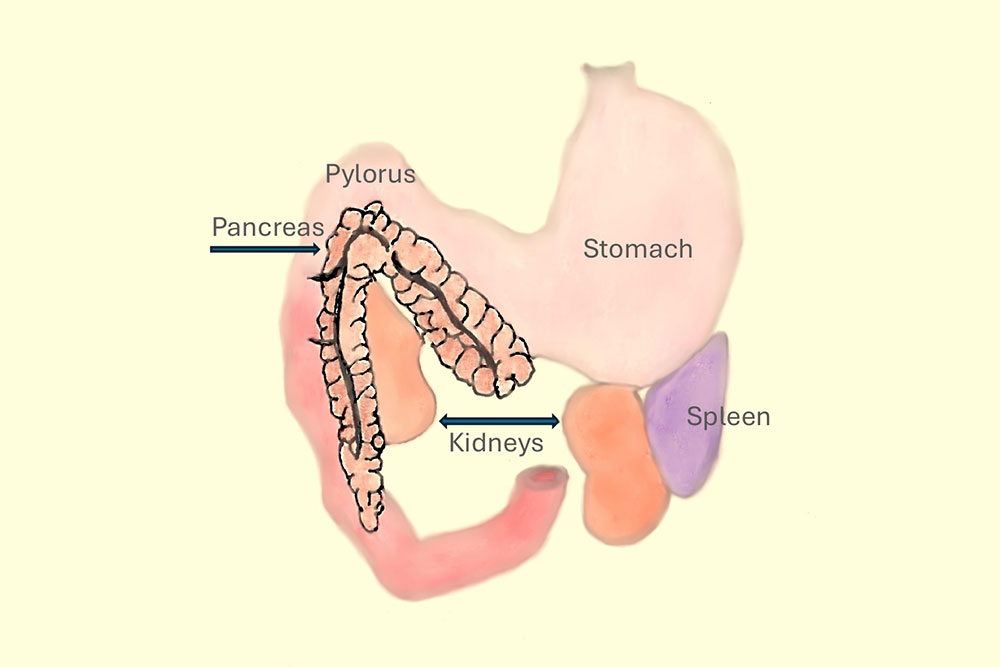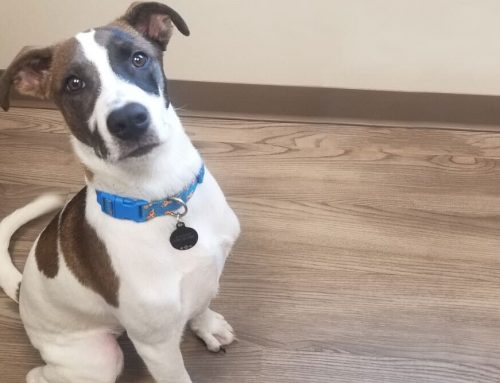
A high-fat diet and obesity are primary contributors to pancreatitis.
Pets can sometimes develop painful or dangerous illnesses and conditions, and it isn’t always clear to their human family members that they have become sick. Sometimes a dog or cat might become lethargic, and their people think their pets are just having a lazy day. Their dogs or cats might not have much appetite, but their humans don’t recognize that as a symptom for a day or two. Instead, they might compare low food interest to their own days when they’re not particularly hungry.
“Sometimes, lethargy and loss of appetite can be early symptoms of bigger problems, though,” said Dr. Bailey Pietsch. “When dogs then develop diarrhea, vomit and seem to exhibit abdominal pain, there is a possibility they have pancreatitis.” Cats present less consistently than dogs, she said, but they are likely to vomit, and they may have abdominal pain, even though they are often less demonstrative about that.
Veterinary scientists have no clear-cut answers about how cats develop pancreatitis, but some believe there is a link between inflammatory bowel disease and the illness. “With dogs, the causes are better defined,” said Pietsch. “Diets high in fat – either through regular meals or treats – are big culprits and work in tandem with another cause: obesity.” Sometimes a pet might develop a tumor on the pancreas, and some dog breeds – such as a miniature schnauzer – seem to be predisposed to developing pancreatitis.
What does the pancreas do?

“The pancreas is a small organ nestled near the stomach and first section of the small intestine,” said Pietsch. “The pancreas gland is composed of endocrine and exocrine glands, among other things. Endocrine glands produce insulin and glucagon, the metabolic hormones that regulate blood sugar. Exocrine glands make the digestive enzymes that flow directly into the gastrointestinal tract.”
How is pancreatitis diagnosed?
Veterinarians have several methods for diagnosing the illness in pets showing symptoms. For example, Greendale Village Vet will run a pancreatic lipase immunoreactivity test. “That usually has a low level in the blood,” a said Pietsch, “so if it is elevated, that points to pancreatitis. The clinic can also send bloodwork to a reference library to help with our diagnosis.”
Pietsch said the doctors might choose to take an x-ray, because if there is significant swelling and inflammation, it will be visible. That tool is not as commonly used as ultrasound, though. “Abdominal ultrasound is a good tool for us, but we need to use it when the pet is having a flareup. All of those tests, of course, are used when taking the pet’s symptoms into account also.”
Can pancreatitis be cured?
“We don’t use the word ‘cure’ when we talk about treating pancreatitis,” said Pietsch. “What we do is manage care. For example, with mild cases we might provide medicine for nausea and vomiting, stomach protection and pain. We would likely recommend a prescription diet, and if the pet’s loss of appetite isn’t returning, we can prescribe medicine to stimulate that. In some cases, pets can become dehydrated from vomiting and diarrhea, so we might need to rehydrate them intravenously.”
Pietsch said severe cases of pancreatitis are not common, but the treatment options are similar to those of pets with mild conditions, except they are conducted in a hospital setting. In addition to the intravenous therapy, they might also need feeding tubes until they show signs they’re ready to eat again.
“Very severe cases are rare,” said Pietsch, “but what happens in those instances can be devastating for the pets and their families.” If the liver becomes damaged, it cannot provide proper filtration of the body’s toxins. When that happens, the pet’s brain could become damaged. Blood clotting functions can also be compromised, causing abnormal bleeding and clotting.”
“That may sound terrifying for owners who suspect their pets have pancreatitis,” said Pietsch, “but those kinds of cases truly are very rare. Generally, when pets respond well to treatments, their prognosis is very good. What’s most important is reducing the risk pets will develop illness in the first place by ensuring they have healthy, low-fat diets.
“Remember, though: Never give dogs products with sorbitol in them, because that chemical is toxic for dogs. Avoid products that say ‘sugar free’ because they won’t help with weight control. Instead, they could lead to illness.”
For more information, call 414-421-1800, or visit greendalevillagevet.com.







Leave A Comment